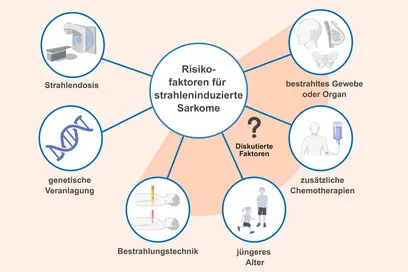Bei rund fünf bis zehn Prozent aller Fälle von Brustkrebs liegt eine familiäre Häufung der Erkrankungen vor – hier spielen Vererbung und damit genetische Faktoren eine Rolle. Veränderungen in den als “Brustkrebsgenen“ bekannten Erbanlagen BRCAI und BRCAII sind eine der wichtigsten Ursachen für familiären Brustkrebs – sie sind für rund ein Viertel dieser Fälle verantwortlich.
“In Deutschland sind 75 Prozent der familiären Brustkrebsfälle nicht durch BRCAI- und BRCAII-Mutationen erklärbar. Wir gehen davon aus, dass diese Krankheitsfälle teils durch seltene Mutationen und teils durch eine unglückliche Kombination von Risikovarianten in verschiedenen Genen ausgelöst werden, von denen sich jede einzelne nur schwach auswirkt. Erst wenige davon sind bereits identifiziert – nach den anderen suchen wir“, erklärt Privatdozentin Dr. Barbara Burwinkel aus dem Deutschen Krebsforschungszentrum.
Mitglieder der AKAP-Proteinfamilie sind in der Zelle für die Weiterleitung wichtiger Signale zuständig. Wissenschaftler haben diese Proteine im Verdacht, an der Krebsentstehung beteiligt zu sein. Eine große internationale Studie unter der Leitung von Barbara Burwinkel brachte für Brustkrebs nun den Beweis.
In Zusammenarbeit mit dem Deutschen Konsortium für familiären Brust- und Ovarialkrebs untersuchte das Forscherteam um Barbara Burwinkel sechs Genvarianten in der AKAP-Familie. Zwei davon, beide im Gen AKAP9 gelegen, stehen tatsächlich mit einem erhöhten Brustkrebsrisiko in Verbindung. Die beiden Genvarianten werden stets gemeinsam vererbt, daher lässt sich ohne weitere Untersuchungen nicht beurteilen, ob eine der beiden oder beide Varianten in Kombination für den Risikoeffekt verantwortlich sind. Dieser Befund wurde in einer großen internationalen Studie in Zusammenarbeit mit Forschern aus Deutschland, Großbritannien, den USA und Australien bestätigt. Insgesamt wurden 9523 Brustkrebspatientinnen, darunter 2795 familiäre Brustkrebsfälle, und fast 14.000 gesunde Frauen untersucht.
Frauen, die die zwei Varianten in beiden Kopien ihrer AKAP9-Gene aufweisen, haben ein um 17 Prozent erhöhtes Risiko, im Laufe ihres Lebens an Brustkrebs zu erkranken. Bei Frauen aus Brustkrebsfamilien ist dieser Effekt noch deutlicher, ihr Risiko ist um 27 Prozent gesteigert. Ist nur eine der beiden Kopien von AKAP9 betroffen, so ist das Brustkrebsrisiko nur leicht erhöht: um etwa acht Prozent bzw. zwölf Prozent bei Frauen aus Brustkrebsfamilien.
“Das zeigt, dass die AKAP9-Varianten sich längst nicht so stark auf das Brustkrebsrisiko auswirken wie etwa die BRCA-Mutationen. Dafür kommen diese Varianten viel häufiger in der Bevölkerung vor. Wir wissen außerdem noch nicht, welche Regelkreise des Zellstoffwechsels beeinträchtigt werden und wie dies zu Krebs führen kann“, schränkt Barbara Burwinkel ein. “Es gibt aber bereits Hinweise, dass die beiden Varianten auch das Risiko, an Lungen- oder Dickdarmkrebs zu erkranken, steigern.“
Bernd Frank, Miriam Wiestler, Silke Kropp, Kari Hemminki, Amanda B. Spurdle, Christian Sutter, Barbara Wappenschmidt, Xiaoqing Chen, Jonathan Beesley, John L. Hopper, Australian Breast Cancer Family Study Investigators, Alfons Meindl, Marion Kiechle, Tracy Slange , Peter Bugert, Rita K. Schmutzler, Claus R. Bartram, Dieter Flesch-Jany , Elke Mutschelknauss, Katie Ashton, Ramona Salazar, Emily Webb, Ute Hamann, Hiltrud Brauch, Christina Justenhove , Yon-Dschun Ko, Thomas Brüning, Isabel dos Santos Silva, Nichola Johnson, Paul P. D. Pharoah, Alison M. Dunning, Karen A. Pooley, Jenny Chang-Claude, Douglas F. Easton, Julian Peto, Richard Houlston, Gene Environment Interaction and Breast Cancer in Germany Group, Kathleen Cuningham Foundation Consortium for Research into Familial Breast Cancer Investigators, Australian Ovarian Cancer Study Management Group, Georgia, Chenevix-Trench, Olivia Fletcher und Barbara Burwinkel: Association of a Common AKAP9 Variant With Breast Cancer Risk: A Collaborative Analysis. Journal of the National Cancer Institute, Band 100, Seite 1, 2008
Über das DKFZ
Das Deutsche Krebsforschungszentrum (DKFZ) ist mit mehr als 3.000 Mitarbeiterinnen und Mitarbeitern die größte biomedizinische Forschungseinrichtung in Deutschland. Wissenschaftlerinnen und Wissenschaftler erforschen im DKFZ, wie Krebs entsteht, erfassen Krebsrisikofaktoren und suchen nach neuen Strategien, die verhindern, dass Menschen an Krebs erkranken. Sie entwickeln neue Methoden, mit denen Tumoren präziser diagnostiziert und Krebspatienten erfolgreicher behandelt werden können. Beim Krebsinformationsdienst (KID) des DKFZ erhalten Betroffene, Interessierte und Fachkreise individuelle Antworten auf alle Fragen zum Thema Krebs.
Um vielversprechende Ansätze aus der Krebsforschung in die Klinik zu übertragen und so die Chancen von Patientinnen und Patienten zu verbessern, betreibt das DKFZ gemeinsam mit exzellenten Universitätskliniken und Forschungseinrichtungen in ganz Deutschland Translationszentren:
- Nationales Centrum für Tumorerkrankungen (NCT, 6 Standorte)
- Deutsches Konsortium für Translationale Krebsforschung (DKTK, 8 Standorte)
- Hopp-Kindertumorzentrum (KiTZ) Heidelberg
- Helmholtz-Institut für translationale Onkologie (HI-TRON) Mainz – ein Helmholtz-Institut des DKFZ
- DKFZ-Hector Krebsinstitut an der Universitätsmedizin Mannheim
- Nationales Krebspräventionszentrum (gemeinsam mit der Deutschen Krebshilfe)
Das DKFZ wird zu 90 Prozent vom Bundesministerium für Forschung, Technologie und Raumfahrt und zu 10 Prozent vom Land Baden-Württemberg finanziert und ist Mitglied in der Helmholtz-Gemeinschaft Deutscher Forschungszentren.


